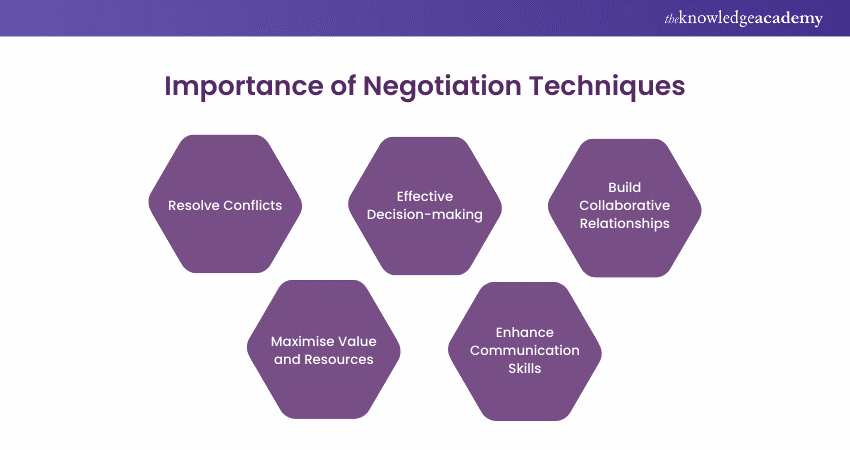We may not have the course you’re looking for. If you enquire or give us a call on + 1-866 272 8822 and speak to our training experts, we may still be able to help with your training requirements.
Training Outcomes Within Your Budget!
We ensure quality, budget-alignment, and timely delivery by our expert instructors.

Imagine you’re negotiating a crucial business deal that could significantly impact your company’s future. The stakes are high, and both parties have their own interests and goals. Given such a situation, how do you ensure a favourable outcome? The answer lies in mastering effective Negotiation Techniques.
In this blog, we will explore over 10 powerful tactics that can transform your approach to negotiations. Be it for closing a business deal, negotiating a salary increase, or simply improving your everyday interactions, these Negotiation Techniques can help you confidently navigate any negotiation scenario. Let’s dive in and discover the secrets to successful negotiations!
Table of Contents
1) What is Negotiation?
2) Importance of Negotiation Techniques
3) What are Negotiation Techniques?
a) Thorough Preparation
b) Active Listening
c) Open-ended Questions
d) Empathy and Understanding
e) Setting Clear Goals
f) Using the Power of Silence
g) Focus on Interests
h) Finding Common Ground
i) Brainstorming and Problem-solving
j) Building Relationships
4) Conclusion
What is Negotiation?
Negotiation is a strategic discussion aimed at resolving issues in a mutually acceptable way. Each party tries to persuade the other, involving communication, compromise, and mutual understanding to reach a beneficial outcome. Effective negotiation requires skills like active listening, emotional intelligence, and clear articulation of needs. It is essential in various aspects of life, from personal relationships to professional settings, for conflict resolution, securing agreements, and fostering collaboration.
To better understand how negotiation tactics work, let’s consider a hypothetical example. Suppose you run a bakery that requires a consistent supply of doughnut flour mix at a price that ensures a reliable profit on your doughnut sales. To achieve this, you approach the supplier of the doughnut flour mix and discuss your need for a lower price. The supplier, on the other hand, seeks steady business and a long-term partnership while maintaining their profit margins. Through the negotiation process, both you and the supplier will collaborate to agree on a price that is mutually beneficial.
Importance of Negotiation Techniques
Negotiation Techniques enable individuals to resolve conflicts, make informed decisions, and build strong relationships. Let’s look at the significance of such techniques:

a) Negotiation is a structured approach to resolving conflicts, fostering open communication, active listening, and exploring different viewpoints. It helps identify common interests and find mutually beneficial solutions.
b) Essential in decision-making, negotiation allows for challenging assumptions, offering creative solutions, and critically analysing problems. It ensures diverse views are considered, leading to better decisions and a sense of ownership.
c) Negotiation builds relationships based on trust, respect, and understanding, promoting long-term collaboration by finding common ground and aligning interests.
d) It enables efficient resource allocation by leveraging strengths and expertise to create value-added solutions.
Negotiation also enhances communication skills through active listening, clear expression of ideas, and effective articulation of interests and concerns, helping convey complex ideas and adapt to different contexts and personalities.
What are Negotiation Techniques?
Now that we know the importance of Negotiation and Negotiation Techniques definition, we will look into those basic techniques. This blog section will dive deeper into certain techniques for effective communication and collaboration:
1) Thorough Preparation
Thorough preparation sets the foundation for successful Negotiations. Before engaging, invest time in gathering relevant information, studying the subject matter, and understanding the needs and interests of all parties involved. Thorough preparation allows you to approach Negotiations with confidence, make informed decisions, and adapt to changing circumstances.
Master the skills to communicate effectively in any business setting – sign up for our Business Communication Course today!
2) Active Listening
Active listening is a fundamental quality of effective Negotiation. By attentively listening to the other party, you convey respect and empathy. This technique enables you to understand their perspective, uncover their underlying interests, and identify potential areas of agreement. Active listening builds rapport and lays the groundwork for collaborative problem-solving.
3) Open-ended Questions
Asking open-ended questions motivates the other party to provide detailed responses, going beyond simple "yes" or "no" answers. These questions promote deeper insights into the other party's thoughts, concerns, and motivations. By eliciting comprehensive responses, you gain a better understanding of their perspective, facilitating a more productive and meaningful Negotiation process.
4) Empathy and Understanding
Demonstrating empathy is essential while negotiating. It's an attempt to put yourself in the other party's shoes to understand their emotions, concerns, and motivations. By showing empathy, you can facilitate a safe and trusting environment which encourages open communication and collaboration. Understanding the other party's perspective allows you to craft solutions that meet their needs while addressing your own.
5) Setting Clear Goals
Clear goals are crucial for effective Negotiation. Before commencing, clearly define your objectives and desired outcomes. Setting specific goals keeps you focused and helps you evaluate potential agreements against your predetermined criteria. Clear goals also provide a benchmark for measuring the success of the Negotiation process.
6) Using the Power of Silence
Silence can say more than words ever could, and it can be a potent tool during Negotiations. After the other party speaks, allow brief pauses instead of rushing to respond. This technique encourages the other party to provide additional information or concessions. Silence also creates space for thoughtful reflection, prevents hasty decision-making, and can compel the other party to fill the void with valuable insights or compromises.
7) Focus on Interests
To achieve mutually beneficial outcomes, it is crucial to focus on common interests rather than rigid positions. Positions are often fixed and can lead to an impasse. By understanding the underlying interests and motivations driving each party, you can explore creative solutions that satisfy everyone involved. This approach expands the scope of possibilities and fosters win-win outcomes.
Sign up for our Assertiveness Skills Training and learn to express yourself confidently and stand up for your rights!
8) Finding Common Ground
Identifying areas of agreement and shared interests is essential for effective Negotiation. Emphasise commonalities and seek to build upon them. Finding common ground creates a positive atmosphere, establishes a sense of collaboration, and lays the foundation for constructive problem-solving. By focusing on shared interests, you can forge stronger relationships, which increase the likelihood of reaching agreements.
9) Brainstorming and Problem-solving
Encourage open discussion and brainstorming sessions to generate innovative ideas and alternative solutions. Involve all parties in problem-solving, leveraging their unique perspectives and expertise. By promoting a collaborative environment, you empower each party to contribute actively, increasing their sense of ownership and commitment to the Negotiated outcome.
10) Building Relationships
Negotiations often involve ongoing relationships. Invest time in building positive relationships, even if you disagree on certain issues. Cultivating trust, respect, and goodwill strengthens interpersonal connections, facilitates open communication, and improves long-term outcomes. Building relationships creates a foundation for future collaborations and enhances the potential for mutual success.
11) Flexibility and Compromise
Negotiation demands flexibility and a willingness to compromise. Understand that not all demands can be met entirely. Instead, explore flexible options and seek creative solutions that are considerate of the interests of all parties involved. Demonstrating flexibility and a cooperative attitude promotes goodwill and strengthens the likelihood of reaching mutually satisfactory agreements.
12) Maintaining Professionalism
Professionalism is paramount throughout the Negotiation process. Emphasise the issues at hand rather than resorting to personal attacks or negative emotions. Maintain a respectful and composed demeanour, even when faced with challenging situations. Professionalism enhances your credibility, encourages cooperation, and improves the overall atmosphere of the Negotiation.
13) Prepare for the Best and Worst-case Scenarios
As important as it is to have a positive attitude, you should also be prepared to handle the situation if the negotiation goes south. Having an understanding of both the best and the worst-case scenario is a critical negotiation strategy to adopt. Being aware of the most desirable outcome and the lowest desirable outcomes can help both parties to find a middle ground.
14) Be Clear and Remember to Highlight the Benefits
Being articulate and clear is very important. Putting forth your message and the terms you are implying clearly helps the negotiation proceed smoothly. Keep in mind that in a negotiation the other party will concentrate on what they take back from it and are looking to benefit from this deal. Put across what you have to offer and remember to highlight the benefits it may reap, as it will play a role in convincing the other party that it is a fair negotiation.
15) Documenting Agreements
After reaching an agreement, document the terms and conditions in writing. Clear and concise documentation makes sure that all parties have a shared understanding of the agreed-upon terms. This practice reduces the risks of misunderstandings or disputes in the future. It provides a reliable reference for ongoing collaboration and ensuring the sustainability of the negotiated outcome.
Conclusion
All in all, effective Negotiation Techniques are vital for successful communication and collaboration. By incorporating such techniques into your Negotiation repertoire, you can effectively enhance your communication ability to , understand the needs of others, build collaborative relationships, and achieve mutually beneficial outcomes.
Transform your personal and professional interactions by joining our Communication Skills Courses – book your spot now!
Frequently Asked Questions

Ethical considerations can be integrated into Negotiation Techniques by following some principles, such as honesty, reciprocity, publicity, universality, and legacy. These principles can help Negotiators avoid unethical behaviour, build trust and credibility, and achieve win-win outcomes.

Cultural awareness and sensitivity can enhance cross-cultural Negotiation skills by facilitating understanding and preventing misunderstandings and conflicts. Negotiators can improve their cultural awareness and sensitivity by learning about their counterpart’s culture, communication style, values, and preferences.

The Knowledge Academy takes global learning to new heights, offering over 30,000 online courses across 490+ locations in 220 countries. This expansive reach ensures accessibility and convenience for learners worldwide.
Alongside our diverse Online Course Catalogue, encompassing 19 major categories, we go the extra mile by providing a plethora of free educational Online Resources like News updates, Blogs, videos, webinars, and interview questions. Tailoring learning experiences further, professionals can maximise value with customisable Course Bundles of TKA.

The Knowledge Academy’s Knowledge Pass, a prepaid voucher, adds another layer of flexibility, allowing course bookings over a 12-month period. Join us on a journey where education knows no bounds.

The Knowledge Academy offers various Communication Skills Courses including Negotiation skills and Negotiation Techniques. These courses cater to different skill levels, providing comprehensive insights into Negotiation Methodologies.
Our Business skills Blogs cover a range of topics related to communication skills along with negotiation techniques and examples, offering valuable resources, best practices, and industry insights. Whether you are a beginner or looking to advance your Communication skills, The Knowledge Academy's diverse courses and informative blogs have you covered.
Upcoming Business Skills Resources Batches & Dates
Date
 Public Speaking Course
Public Speaking Course
Fri 10th Jan 2025
Fri 28th Feb 2025
Fri 4th Apr 2025
Fri 16th May 2025
Fri 11th Jul 2025
Fri 19th Sep 2025
Fri 21st Nov 2025







 Top Rated Course
Top Rated Course



 If you wish to make any changes to your course, please
If you wish to make any changes to your course, please


